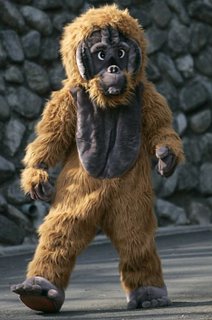When American Idol first began a few years ago, I did watch some bits and pieces, thought "feh! who cares" and went on my way. But I decided like any good media critic, I should sit and watch as many episodes as I could ... which I have done for this season. I confess, it has become more and more difficult to sit through an hour (much less two) of this drivel.
It should now and forever be called American iDull.
So I will not watch anymore, I cannot. I hope you who do appreciate that this experience is an endless series of unimaginative judging, which essentially boils down to three words, one for each judge -- "dog", "beautiful" and "terrible", and an endless series of humiliations - "you've just been kicked off as the worst singer of the bunch, so 'cmon and sing one more time through your tears while the winners sing behind your back."
Whatever, people.
But since I'm on the topic of appetites for humiliation and cruelty, then let's talk about the current rage for a series of movies called "Saw."
I've always been a fan of horror films and always will be. However, movies like "Saw", "Hostel", "Wolf Creek," and others in recent years have been more about sadistic cruelties than narrative entertainments. It's a boring claim, yes, made in the past about everything from comic books to rock music. I'm going to do my best here not to write some pedantic student film research treatise. It's just that all movies - not just horror movies - have subtexts, both intended and unintended - which can make them both popular and profitable.
So I've been pondering on the subtexts in the "Saw" series. Grime-encrusted clockwork technologies, crude and blunt and brutal machines and damn near medieval "teach-the-bad-person-a-lesson" plot points are all integral parts to these movies. It's their appearance and the gory outcomes that audiences and critics all talk about. But why does it appeal to today's audiences?

Today's world is abuzz with new tech, not low tech. Most people can relate to feelings of being trapped by tech innovations, even simple ones like being stuck forever on the telephone menu pressing one button to go here or another to go there and never encountering anything with a human connection. Those who do not have broadband-connected lives, MP3 players or MySpace pages likely feel keenly disconnected from the times they inhabit. Perhaps it's a subconscious realization that the world is littered with technologies ancient and recent. We rely on machines most of us could never create ourselves, but which so dominate actions we must all take.
And there is a connection, too, I think, between these movies and the America with a 9-11 worldview. Smart-bombs and high-tech war machines are battling with unorganized and random enemies who use homemade explosives. Can a box-cutter and some fuel make a weapon which cannot be defeated? And it seems odd to me that in years past we used the word "bomb" and today the preferred word is "improvised explosive device", as if giving it a complex title transforms it's basic crudeness into a more technological danger. How, many may subconsciously wonder, can we not win a battle between hi and low tech?
And typically in the "Saw" films, the audiences is left to consider that if the intended victims just stay calm and think, they can figure a way out of a death-trap. Ironically in this series of movies, the one woman who can escape then joins in the game of making death-traps herself.
Discussions of torture and of morality are certainly prevalent in today's world. And as I said, there are intended and unintended subtexts in any movie -- even the crudest film made just to turn a tidy profit is an exercise not just in business, but in stimulus and response.
Is there a politics of the horror film?


